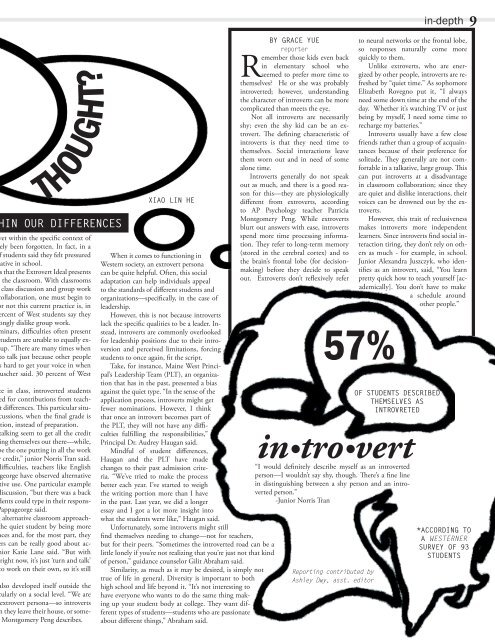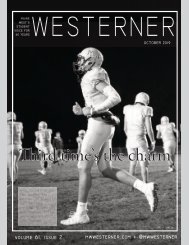You also want an ePaper? Increase the reach of your titles
YUMPU automatically turns print PDFs into web optimized ePapers that Google loves.
in-depth 9<br />
THOUGHT?<br />
IN OUR DIFFERENCES<br />
et within the specific context of<br />
ly been forgotten. In fact, in a<br />
students said they felt pressured<br />
ative in school.<br />
that the Extrovert Ideal presents<br />
the classroom. With classrooms<br />
class discussion and group work<br />
ollaboration, one must begin to<br />
r not this current practice is, in<br />
rcent of West students say they<br />
ngly dislike group work.<br />
inars, difficulties often present<br />
tudents are unable to equally exup.<br />
“There are many times when<br />
o talk just because other people<br />
hard to get your voice in when<br />
scher said. 30 percent of West<br />
e in class, introverted students<br />
d for contributions from teachdifferences.<br />
This particular situussions,<br />
when the final grade is<br />
ion, instead of preparation.<br />
alking seem to get all the credit<br />
ng themselves out there—while,<br />
e the one putting in all the work<br />
credit,” junior Norris Tran said.<br />
ifficulties, teachers like English<br />
eorge have observed alternative<br />
ive use. One particular example<br />
iscussion, “but there was a back<br />
ents could type in their responsappageorge<br />
said.<br />
alternative classroom approachhe<br />
quiet student by being more<br />
ces and, for the most part, they<br />
rs can be really good about acior<br />
Katie Lane said. “But with<br />
right now, it’s just ‘turn and talk’<br />
o work on their own, so it’s still<br />
lso developed itself outside the<br />
ularly on a social level. “We are<br />
xtrovert persona—so introverts<br />
they leave their house, or some-<br />
Montgomery Peng describes.<br />
XIAO LIN HE<br />
When it comes to functioning in<br />
Western society, an extrovert persona<br />
can be quite helpful. Often, this social<br />
adaptation can help individuals appeal<br />
to the standards of different students and<br />
organizations—specifically, in the case of<br />
leadership.<br />
However, this is not because introverts<br />
lack the specific qualities to be a leader. Instead,<br />
introverts are commonly overlooked<br />
for leadership positions due to their introversion<br />
and perceived limitations, forcing<br />
students to once again, fit the script.<br />
Take, for instance, Maine West Principal’s<br />
Leadership Team (PLT), an organization<br />
that has in the past, presented a bias<br />
against the quiet type. “In the sense of the<br />
application process, introverts might get<br />
fewer nominations. However, I think<br />
that once an introvert becomes part of<br />
the PLT, they will not have any difficulties<br />
fulfilling the responsibilities,”<br />
Principal Dr. Audrey Haugan said.<br />
Mindful of student differences,<br />
Haugan and the PLT have made<br />
changes to their past admission criteria.<br />
“We’ve tried to make the process<br />
better each year. I’ve started to weigh<br />
the writing portion more than I have<br />
in the past. Last year, we did a longer<br />
essay and I got a lot more insight into<br />
what the students were like,” Haugan said.<br />
Unfortunately, some introverts might still<br />
find themselves needing to change—not for teachers,<br />
but for their peers. “Sometimes the introverted road can be a<br />
little lonely if you’re not realizing that you’re just not that kind<br />
of person,” guidance counselor Gilit Abraham said.<br />
Similarity, as much as it may be desired, is simply not<br />
true of life in general. Diversity is important to both<br />
high school and life beyond it. “It’s not interesting to<br />
have everyone who wants to do the same thing making<br />
up your student body at college. They want different<br />
types of students—students who are passionate<br />
about different things,” Abraham said.<br />
BY GRACE YUE<br />
reporter<br />
Remember those kids even back<br />
in elementary school who<br />
seemed to prefer more time to<br />
themselves? He or she was probably<br />
introverted; however, understanding<br />
the character of introverts can be more<br />
complicated than meets the eye.<br />
Not all introverts are necessarily<br />
shy; even the shy kid can be an extrovert.<br />
The defining characteristic of<br />
introverts is that they need time to<br />
themselves. Social interactions leave<br />
them worn out and in need of some<br />
alone time.<br />
Introverts generally do not speak<br />
out as much, and there is a good reason<br />
for this—they are physiologically<br />
different from extroverts, according<br />
to AP Psychology teacher Patricia<br />
Montgomery Peng. While extroverts<br />
blurt out answers with ease, introverts<br />
spend more time processing information.<br />
They refer to long-term memory<br />
(stored in the cerebral cortex) and to<br />
the brain’s frontal lobe (for decisionmaking)<br />
before they decide to speak<br />
out. Extroverts don’t reflexively refer<br />
to neural networks or the frontal lobe,<br />
so responses naturally come more<br />
quickly to them.<br />
Unlike extroverts, who are energized<br />
by other people, introverts are refreshed<br />
by “quiet time.” As sophomore<br />
Elizabeth Rovegno put it, “I always<br />
need some down time at the end of the<br />
day. Whether it’s watching TV or just<br />
being by myself, I need some time to<br />
recharge my batteries.”<br />
Introverts usually have a few close<br />
friends rather than a group of acquaintances<br />
because of their preference for<br />
solitude. They generally are not comfortable<br />
in a talkative, large group. This<br />
can put introverts at a disadvantage<br />
in classroom collaboration; since they<br />
are quiet and dislike interactions, their<br />
voices can be drowned out by the extroverts.<br />
However, this trait of reclusiveness<br />
makes introverts more independent<br />
learners. Since introverts find social interaction<br />
tiring, they don’t rely on others<br />
as much - for example, in school.<br />
Junior Alexandra Juszczyk, who identifies<br />
as an introvert, said, “You learn<br />
pretty quick how to teach yourself [academically].<br />
You don’t have to make<br />
a schedule around<br />
other people.”<br />
57%<br />
OF STUDENTS DESCRIBED<br />
THEMSELVES AS<br />
INTROVRETED<br />
in•tro•vert<br />
“I would definitely describe myself as an introverted<br />
person—I wouldn’t say shy, though. There’s a fine line<br />
in distinguishing between a shy person and an introverted<br />
person.”<br />
-Junior Norris Tran<br />
Reporting contributed by<br />
Ashley Dwy, asst. editor<br />
*ACCORDING TO<br />
A WESTERNER<br />
SURVEY OF 93<br />
STUDENTS


















